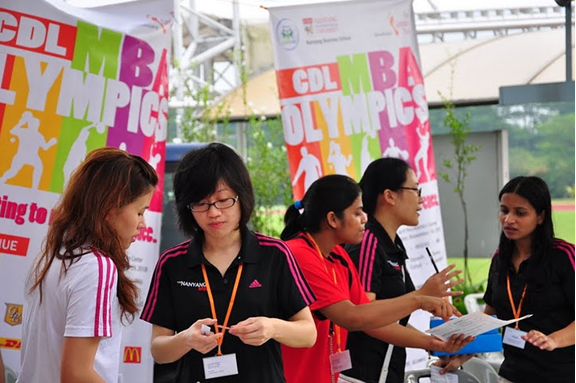NANYANG BUSINESS SCHOOL has launched a Dean’s Seminar Series on Sustainable Development as part of its strategy of producing business leaders for a sustainable world.
The inaugural talk was given by Mr Khoo Teng Chye, Chief Executive, PUB Singapore. He spoke on Ensuring Water Sustainability for Singapore: Turning Scarcity into Opportunity. Over 70 faculty, graduate students and staff attended the talk held in the school on March 10.
In her welcome remarks, Professor Gillian Yeo, Interim Dean, said that the school aims to prepare its students to become business leaders who focus on the triple bottom line of profit, planet and people.

Managing the water loop: Mr Khoo Teng Chye, Chief Executive, PUB Singapore, delivering the inaugural talk.
Prof Yeo said the new seminar series aims to enhance the capabilities of all at NBS to incorporate sustainability issues in the curriculum, research, policies and processes.
“The seminar series will provide a forum for us to listen to and interact with outstanding practitioners and academics with deep expertise and knowledge in specific aspects of sustainability,’’ she added.
In his presentation Mr Khoo highlighted that while Singapore gets enough rain, it does not have the land to collect and store the water due to competing needs of land for other uses in the small island nation.
The PUB manages the whole water cycle, key to which is the use of membranes to reclaim water.
The national water agency aims to provide “Water for all”. This is coupled with the approach to involve the community and companies to Conserve, Value and Enjoy the water.
Singapore has four national taps: local catchment, imported water, NEWater and desalinated water.
As water is a valuable resource, the PUB would like all to help conserve it, value it and enjoy it.
While half of Singapore was already water catchment area, this is being increased to two-thirds by 2011 through an urban storm water collection system and raising the number of reservoirs from 14 to 17 by the addition of Punggol and Serangoon reservoirs and the Marina Barrage.
Mr Khoo said that a combination of strategies was used to achieve water sustainability for Singapore. The effective use of membrane technology to produce NEWater means that it can meet 30 per cent of the country’s water needs this year. However, only 2 per cent was being added to reservoirs for public consumption, while direct supply was being made to industrial users in view of the high quality of the water.
Desalination was expensive compared to using membrane technology, which had brought down the cost considerably.
At the same time a water conservation strategy was employed based on pricing, voluntary and mandatory approach. As a result the per capita consumption of water had dropped significantly since 2003, he added.
As water is an important resource, the National Research Foundation has set aside $330 million over five years as part of the efforts to grow Singapore water industry with the target to increase the value add from $0.5 billion to $1.7 billion and double the number of jobs to 11,000 by 2015.

The talk was followed by a lively discussion
Singapore aims to become a global hydrohub with technology as the key pillar based on cluster development, technology development and internationalization.
Already there is a vibrant water industry here with many international players in R&D activity, regional operations and business headquarters.
The R&D ecosystem includes the Nanyang Environment and Water Research Institute at NTU and several other public and private R&D centres.
Mr Khoo highlighted that over the last three years there had been a five-fold increase in the value of overseas water related projects secured by Singapore companies.
The marketing and branding of Singapore water industry was being done through engaging with international organizations and organizing the Singapore International Week.
Mr Khoo said Singapore universities could play a role in developing the water industry through education, research and consultancy. Particularly, there is a need to develop water entrepreneurs. The water industry needs business managers, not just technical experts.
Research and consultancy support is needed to bring new technology to market. The financing of water projects, water pricing and regulation, and climate change issues were some of the other areas that need attention, he added.









You must be logged in to post a comment.